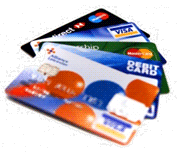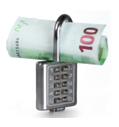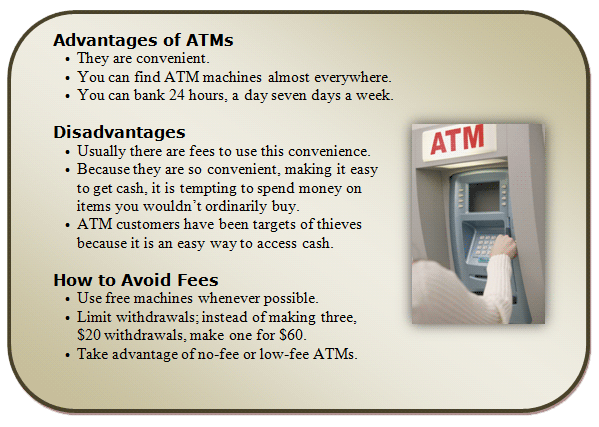MANAGING MONEY - BANKING & TECHNOLOGY
Unit Overview
In this unit, the student will learn how banking has become convenient thanks to technology.
Banking & Technology
There was a time when banking meant a trip to make deposits and withdrawals. Bills were paid by writing checks that were mailed or dropped off in person. Thanks to technology, we can bank 24 hours a day, seven days a week. We can use debit and credit cards to pay for purchases. Today, ATM machines allow us to obtain cash at any time, and online banking features transfer funds, pay bills and check balances electronically. Banking has become very convenient; however, automated banking comes with hazards as well. If you aren’t vigilant about guarding and reviewing your accounts, you could fall prey to fraudulent activity.
Credit and Debit Cards
Credit cards, issued by banks or businesses, enable you to purchase goods or services and to pay for them later. The use of credit cards will be discussed in detail in another unit.
 You can also use a debit card (sometimes called a check card) to pay for goods and services. The money is deducted directly from your checking account, so it is like writing a check. When you are issued a debit card, you are also assigned a personal identification number (PIN) that you use in conjunction with the card. Be careful to guard both the card and PIN carefully as others can use them to access your account.
You can also use a debit card (sometimes called a check card) to pay for goods and services. The money is deducted directly from your checking account, so it is like writing a check. When you are issued a debit card, you are also assigned a personal identification number (PIN) that you use in conjunction with the card. Be careful to guard both the card and PIN carefully as others can use them to access your account.
Debit cards are convenient. Using one won’t put you in debt, and you don’t have to carry cash or a checkbook. You need to be careful to record the transactions you make in your checkbook register or you could end up with too little money in your in your checking account. This could result in a bounced check. Some banks charge a fee for using your debit card, so shop around for a bank that will give you the best deal. Debit cards also provide less protection against fraud than credit cards (more about this later). If you report the loss of a card within two business days, you are only responsible for up to $50. If you wait longer you could end up being responsible for much more. If you do lose your card or discover unauthorized use on your bank statement, report them immediately!
Automatic Teller Machines
Automatic teller machines (ATMs) are another service banks offer. ATMs are computers that let you do banking without a bank employee. To use an ATM, you need a debit or ATM card, a PIN and, of course, ATM. You can use an ATM to make deposits, to withdraw money, to move money from one account to another, and to pay bills. ATMs are convenient because they can be used 24 hours a day, and you can find them everywhere, including grocery stores, restaurants, department stores, movie theaters and gas stations, to name a few. You can apply for an ATM card when you open an account at a bank.
ATMs provide 24 hour service and cost the bank very little compared to using a teller to handle transactions. The fees associated with these machines generate a large amount of money so banks often encourage their use. At first there were no charges associated with ATMs; however, as they became more popular, banks made use of the opportunity to make money. The majority of ATMs have fees, so it is wise to shop around for the best ATM deal.
|
 Electronic funds transfer (EFT) allows employers to deposit paychecks directly into employees’ bank accounts. If fact some places of business use only electronic transfer to pay their employees. When you use your debit card, EFT also is responsible for the transfer of funds from your account to place of purchase (like a grocery store). It also allows you to transfer money from your account to creditors when you pay bills online. Additionally, there are some businesses that use ETF for electronic check conversion. For example, if the drug store you do business with has electronic check conversion, the money is immediately deducted from your account and transferred to the store’s account as soon as the cashier processes check.
Electronic funds transfer (EFT) allows employers to deposit paychecks directly into employees’ bank accounts. If fact some places of business use only electronic transfer to pay their employees. When you use your debit card, EFT also is responsible for the transfer of funds from your account to place of purchase (like a grocery store). It also allows you to transfer money from your account to creditors when you pay bills online. Additionally, there are some businesses that use ETF for electronic check conversion. For example, if the drug store you do business with has electronic check conversion, the money is immediately deducted from your account and transferred to the store’s account as soon as the cashier processes check.
Banking Online
Online banking is a service offered by banks that allows customers access to their account via the Internet. This means you can sit at home (or any place else you have internet service) and transfer money from one account to another, check your balances, print out cancelled checks and even pay bills.
Advantages of Online Banking
- You can access your account 24 hours a day. There is no need to rush to the bank before it closes.
- Your account can be accessed from anywhere in the world. Say you are on vacation and you write a check. If you need to transfer money from your savings to your checking account to cover this, all you need is access to a computer to complete the transaction.
- It helps you keep organized. You can look up past statements, transactions and so much more. Note of caution: it is also a good idea to keep your own records (checkbook register, savings passbook) in case you need information and do not have access to a computer or, heaven forbid, your computer is down.
- It offers easy access to cancelled checks and statements. If your landlord argues you haven’t paid your rent, you can access your account and print out a copy of the cancelled check.
- You can check to see if a written check has cleared, which means the bank processed the check and paid out the money.
- Many banks offer automatic reminders that a bill is due, which helps to cut down on late charges.
- Bills can be paid via online banking. This is probably one of the most convenient features of online banking. You don’t need to write out or mail checks. After you enter your regular monthly payees, with just a few clicks, you can pay most of your bills. You can even set it up so your bills are automatically paid each month. This works well for fixed expenses. Be careful, you still need to be sure you have sufficient funds in your account.
 Word of Caution: Online banking is not without its disadvantages. If your computer isn’t working or the Internet is down, you cannot bank. If you have waited to the last minute to do your banking, this could be a problem. Some people may be concerned about how safe it is to bank using the Internet. To minimize the risk of fraud, online banking is done through a secure server, which grants you private access to your account. Word of Caution: Online banking is not without its disadvantages. If your computer isn’t working or the Internet is down, you cannot bank. If you have waited to the last minute to do your banking, this could be a problem. Some people may be concerned about how safe it is to bank using the Internet. To minimize the risk of fraud, online banking is done through a secure server, which grants you private access to your account. |
Online banking allows direct access to account information, enables transfer of funds, permits multiple bills payments, and supports other transactions. You can bank online any day of the week from anywhere you have access to the internet.
Online banking allows direct access to account information, enables transfer of funds, permits multiple bills payments, and supports other transactions. You can bank online any day of the week from anywhere you have access to the internet.
Read pp 29 of the Federal Reserve Education PDF document Banking Basics.
